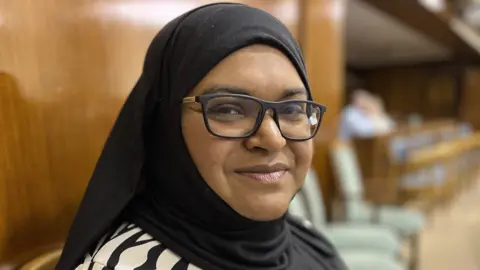The recent Swindon Borough Council meeting on the topic of housing for asylum seekers devolved into an impassioned and contentious debate, sparked particularly by the Conservative councillors’ proposal that aimed to limit the use of local housing for asylum accommodations. As the discussions unfolded, the dynamic turned vociferous, culminating in echoes of “shame” directed at Conservative members during a heated exchange, illustrating the deeply held sentiments on both sides of this contentious issue.
The proposal put forth by Conservative Councillor Daniel Adams, and seconded by Councillor Gayle Cook, suggested that a report should be generated to ensure that the housing stock in Swindon is not utilized for asylum seekers. This motion was defended on the grounds that many working citizens felt marginalized and relegated to “second class citizens” in their own home town. Adams complemented his proposal by requesting that £238,000 of council funds be allocated to local services rather than housing for asylum seekers.
Council Leader Jim Robbins countered this argument robustly, asserting that the reported concerns over local housing being allocated to refugees were unfounded since there are no asylum seekers currently residing in council properties. He characterized the proposal as “poorly thought out,” emphasizing the importance of Swindon’s legacy in providing sanctuary to those in need from various parts of the world. Robbins disapprovingly noted that the motion failed to carry support beyond the Conservative party, with Labour and Liberal Democrat councillors voting against it, leading to its eventual defeat.
Labor Councillor Repi Begum brought a personal dimension to the debate by expressing her lived experiences, vitally noting the implications such arguments could have on the community. She accused the opposition of indulging in “racist tropes” by arguing that immigrants were taking homes away from local families. Such rhetoric, she warned, could incite violence, referencing the turbulent race riots that had erupted in the summer of 2024. Her testimony resonated significantly with the audience, emphasizing the perspective of individuals from minority backgrounds who often face stigmatization during heated political discussions.
Flush with passion, Begum further articulated that common statements like “our children can’t secure homes” echoed an age-old, dangerous narrative that fuels division and hostility. She boldly challenged her counterparts, arguing that when leaders leverage language that implies certain groups have lesser rights to reside in the community, it sets a precedent that risks social cohesion and exacerbates tensions in society.
Despite the escalating disagreement, Adams maintained his stance, asserting that he had not invoked race during his statements and expressed astonishment at the characterization of his arguments as racially charged or designed to quash discourse. This highlights an essential bifurcation in the discussions; the diverging interpretations of the discourse surrounding asylum seekers and the implications for local communities and politics.
In the backdrop of this emotionally charged atmosphere, discussions also leaned towards systemic concerns surrounding housing shortages, which affect both locals and asylum seekers alike. Various representatives pointed out the pressing realities of unaffordable housing, exuding frustration at the constraints individuals face in securing a home. While Business Secretary Jonathan Reynolds acknowledged these frustrations, he highlighted the necessity for constructing additional homes and expediting the processing of asylum applications to alleviate the burdens placed on local housing systems.
In conclusion, the debate surrounding housing for asylum seekers within the Swindon Borough Council epitomizes a broader national conversation about immigration and its impact on local communities. The vehement opposing views reflect deep-seated anxieties about identity, belonging, and the fair distribution of resources. As local governments grapple with these complex issues, it is imperative to foster dialogue that bridges divides rather than deepening them. The ongoing challenge remains to reconcile the needs of local citizens with compassion and support for those seeking refuge in the community.











